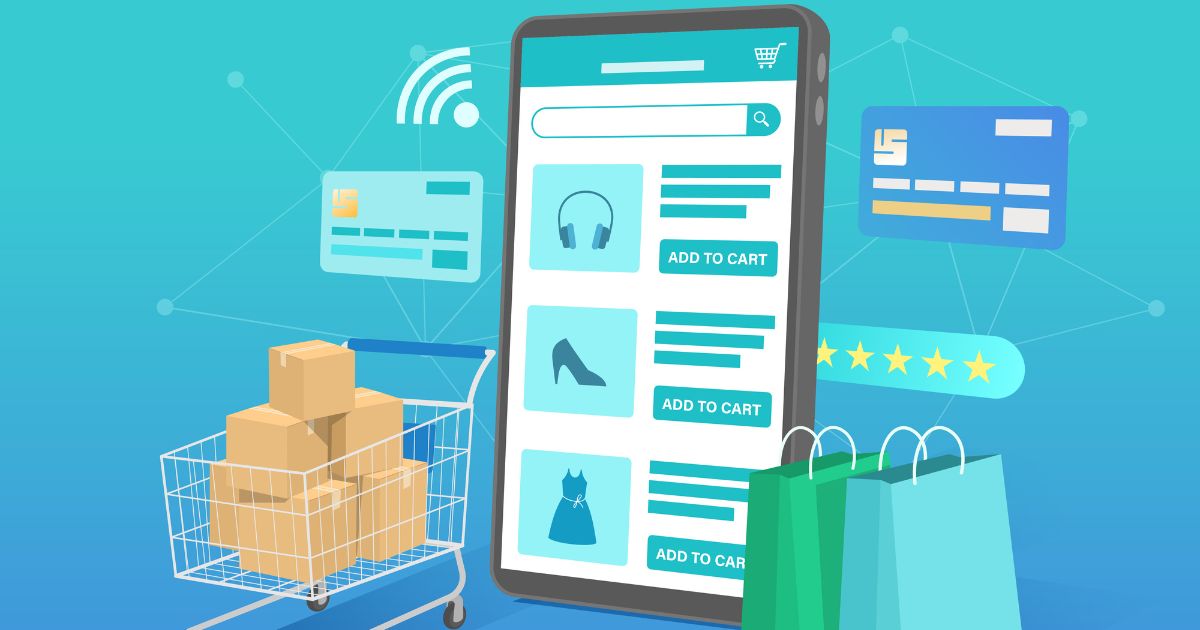- May 25, 2023
- by admin
- Ecommerce SEO
- 0 Comments
The future of e-commerce is full of possibilities for businesses as they navigate the ever-changing online world. With new technologies and changing consumer habits, staying ahead of the competition is vital to succeed in the digital space.
As businesses adapt to the digital world, they face the challenge of keeping up with the changes in online shopping. How people buy and sell products has transformed, bringing opportunities and challenges for entrepreneurs and retailers.
In this blog, we will explore the latest trends and predictions for the future of e-commerce. From the use of artificial intelligence and machine learning to the growing popularity of mobile shopping and the impact of social media, we will examine how these factors will shape the digital landscape.
Let’s dive into the future of e-commerce together and discover the secrets to achieving digital success.
What is E-commerce Marketing?
E-commerce marketing is about using digital strategies to sell products or services online. It involves techniques like SEO, PPC ads, social media, email, content, and improving the user experience.
The goal is to attract customers, drive website traffic, and generate online sales. It’s about creating awareness, building a good brand image, and turning visitors into customers. Businesses use digital marketing strategies specific to e-commerce to reach their target audience, increase online sales, and grow in the competitive online marketplace.
The Future of E-commerce SEO: Emerging Trends and Predictions
As we venture into the digital landscape, the future of online business remains to be determined. However, by analyzing current trends and making predictions, we can gain insights into what lies ahead
Let’s delve into it:
Artificial Intelligence Takes Center Stage in E-commerce
In the ever-expanding landscape of e-commerce, streamlining operations has become increasingly vital. Businesses are now turning to AI and machine technologies to achieve this. These technologies allow enterprises to automate daily tasks, gather valuable data, and make informed decisions.
The Chatbot
One of the AI technologies that businesses can effectively utilize is the chatbot. Chatbots are designed to enhance customer interactions through automated messaging. These virtual assistants can engage with customers, provide instant responses to queries, and offer personalized recommendations.
Additionally, chatbots can collect valuable data on customer preferences, behaviors, and trends. This information can be utilized to tailor marketing strategies, optimize product offerings, and improve overall business decision-making.
The Predictive Analytics
Predictive analytics is the process of using statistical algorithms and machine learning techniques. It analyzes historical data and makes predictions about future outcomes. It involves identifying patterns, trends, and relationships within the data to generate insights for decision-making.
Online businesses can leverage predictive analytics to understand their target audience better. By analyzing customer data, such as purchase history, browsing behavior, demographics, and preferences, businesses can make data-driven decisions to optimize various aspects of their operations. It includes personalizing marketing campaigns, recommending relevant products, improving inventory management, and enhancing customer service.
Workflow Automation
Workflow automation refers to automating manual and repetitive tasks within a business or organization. It involves using technology and software to streamline and optimize workflows, eliminating the need for manual intervention and reducing the risk of errors.
Automating workflows can improve efficiency, productivity, and accuracy in their operations. Time consuming tasks are prone to human errors. Automation of these tasks through the use of software or tools will save time and increase the efficiency.
Workflow automation typically involves:
- Mapping out the steps in a particular process.
- Identifying areas where automation can be applied.
- Implementing the necessary tools or software to execute the automation.
It can include workflow management systems, robotic process automation (RPA), or custom software solutions tailored to the business’s needs.
Increase your Focus on Personalization | E-commerce Marketing
In digital marketing, businesses often fall into the trap of creating a one-size-fits-all approach to content creation. However, in 2023, a growing trend has emerged emphasizing the importance of personalization in content marketing, particularly on social media platforms.
Rather than creating a generic piece of content to be distributed across all platforms, businesses recognize the need to tailor content for each social media platform. This shift is driven by the understanding that different platforms have distinct user demographics, preferences, and engagement patterns.
Businesses can connect with their target audience more deeply by focusing on personalization. They can craft content that aligns with users’ unique characteristics and behaviors on each platform. It includes considering language, tone, visual style, and content format.
Personalized content resonates more with users as it addresses their needs, interests, and pain points. It helps businesses build stronger relationships, foster engagement, and drive meaningful interactions with their audience. By providing valuable and tailored content, companies can enhance their brand perception and position themselves as industry leaders.
Online businesses can leverage data analytics and insights gained from social media platforms. By analyzing user behavior, preferences, and engagement metrics, companies can better understand their audience and create content that truly resonates with them.
Voice Powered AI in E-commerce
Voice-powered AI in e-commerce refers to integrating voice recognition technology into online shopping experiences. With the rise of virtual assistants like Amazon Alexa, Google Assistant, and Apple Siri, consumers can now use voice commands to interact with e-commerce platforms and make purchases.
Voice-powered AI offers several advantages in the e-commerce space. Firstly, it provides a more convenient and hands-free shopping experience for customers. Users can speak their commands or questions instead of typing queries or navigating through menus, enabling faster and more natural interactions.
Additionally, voice-powered AI allows for personalized recommendations and tailored shopping experiences. Virtual assistants can learn about user preferences, purchase history, and browsing behavior to provide customized product suggestions and offers.
Furthermore, voice-powered AI enhances accessibility for individuals with disabilities or those with difficulty using traditional interfaces. It opens up opportunities for a broader range of customers to engage in online shopping and interact with e-commerce platforms.
Growth of Mobile E-commerce
The growth of mobile e-commerce refers to the increasing prevalence and popularity of online shopping. It is conducted through mobile devices such as smartphones and tablets. Advancements in technology have driven this trend. Secondly, the widespread availability of high-speed internet has played a significant role.
Mobile e-commerce has experienced significant growth in recent years and is projected to continue expanding. By 2024, it is estimated that 70% of e-commerce sales will be conducted through mobile devices. This shift is due to the increasing reliance on mobile devices for everyday activities, including shopping.
E-commerce businesses must adapt their strategies and optimize their online presence for mobile devices. It includes creating mobile-responsive websites that provide seamless and user-friendly experiences on smaller screens. Websites should load quickly, have intuitive navigation, and be optimized for touch interactions.
Sustainable and Ethical Shopping

With increasing numbers of customers adopting environmentally conscious attitudes is gradually changing their purchasing behavior. This heightened awareness has a significant impact on the decisions of e-commerce businesses. The business must prioritize offering environmentally friendly and ethically sound products. Failure to do so could result in losing a substantial portion of their customer base.
Subscription Services
Subscription services in e-commerce involve customers paying a recurring fee for ongoing access to products or services. This model provides convenience, value, and personalized experiences. Customers enjoy regular deliveries or continuous access without the need for repeated purchasing decisions.
Businesses benefit from predictable revenue and customer loyalty. Subscription services are famous for their convenience and personalization, making them a prominent trend in e-commerce.
Cybersecurity is on the Top
Cybersecurity is a top priority as technology advances. While technology brings many benefits, it also poses challenges to customer privacy. Therefore, e-commerce must prioritize the protection of customer data and confidentiality.
Concluding Thoughts
The future of e-commerce presents exciting opportunities for businesses to thrive in the digital landscape. Companies can achieve digital success and drive growth by embracing emerging e-commerce marketing trends and staying ahead of the competition.
If staying updated with the latest trends in e-commerce proves to be challenging, our team of professional marketers is here to help. We have the expertise to enhance your business’s online presence and ensure you remain up-to-date with the ever-changing digital landscape.
Don’t wait any longer! Contact us now and take the necessary steps to propel your business toward online success.



